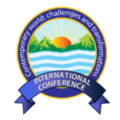
Prof. Dr. Muhammad Khan
Chairman Department of Politics & International Relations
International Islamic University, Islamabad, Pakistan
Short Bio: Dr. Muhammad Khan holds more than 18 years academic experience, and he is currently the Chairman of Department of Politics and International Relations and Director Academics and Examinations in IIUI. Dr Muhammad Khan has been Head of International Relation Department, in the National Defence University (NDU)-Islamabad until July 18, 2016.
He completed his PhD in International Relations from University of Karachi in 2002. He is the founding member of Faculty of Contemporary Studies (FCS) in NDU, having five departments now. He is also pioneer of the International Relations Dept. in NDU. He also established Department of Strategic Studies, Department of Peace and Conflict Studies and Department of Government and Public Policy in the National Defence University, Islamabad. Besides, he acted as pivot in conceptualizing and re-structuring “Institute of Strategic Studies Research and Analysis”(ISSRA)-a national and international think tank. Dr Khan has been on the Panel of Federal Public Service Commission of Pakistan from 2007 to 2015, where his responsibilities included; as paper setter and examiner for CSS and other examinations for selection of candidates in various Departments in Federal Government.
Besides, He is a member of AJK Public Service Commission. Dr Khan is also Chairman of the Research and Policy Forum, being established by AJK Government, the first ever Think Tank, AJK Government will have. Dr Khan has been Member of Prime Minister’s Foreign policy formulation team on Middle East, Central Asia and South Asia. Dr Khan has military background (retired as Brigadier from Pakistan Army), thus has vast experience of Administration, Security, Management and Human Resource Development. Besides, he has vast experience of instruction, teaching and research in Security Studies, International Relations, Defence Studies, Strategic Studies, Peace and Conflict Studies, Social Sciences and Humanities.
Dr Khan has contributed over 61 Research Publications related to national and international issues and has also written 1000 articles, which were published in Newspapers, Magazines and Journals of National and International repute. In recognition of his academic distinction, he was awarded “The Best University Teacher Award” for year 2011-2012 by Higher Education Commission (HEC). Dr Khan has attended and contributed in various national and international conferences, workshops and Seminars on regional and international Issues. Dr Khan has been awarded Civil Award; Tamghai-a-Imtiaz by President of Pakistan on Augusts 14, 2014 for his contributions in academics (research and Teaching) and institution building.
Keynote Topic: The Changing Patterns of Climate and Impacts on Pakistan
A study on changing pattern of the climate reveals that, there would be an ‘eastern shift in monsoon circulation caused by the changing climate.’ In South Asia, such a climatic change is causing ‘more rainfall over the Indian Ocean, Bangladesh and Burma and less rainfall over India, Nepal and Pakistan.’ Since climate change is a gradual process, therefore, its impacts are also gradual and devastating. In Pakistan, the impact of climate change are being felt in all spheres; the rising temperatures, lengthening of growing season, changing in precipitation patterns, prolonged droughts and heat waves. The worst however are; the water crisis in last one decade. There have been less rains over the years to compensate the lost water, therefore, water sources are rapidly drying up, causing anxiety among the huge population and water for agricultural usage. Indeed, in Pakistan, there have been more rains but for a shorter duration, thus not helpful in percolation and raise the ground water level. Besides, the climatic changes and environmental degradation have caused longer spells of drought, resultant water scarcity all over the country. The intense rain-fall at times caused flood in most parts of the country, thus causing; huge loss to population centres, destruction of crops, damaging infrastructure and loss of huge amount of water to sea in the absence of water reservoirs. This paper aims at finding a way forward to mitigate the impact of climate change, particularly in the field of water.
